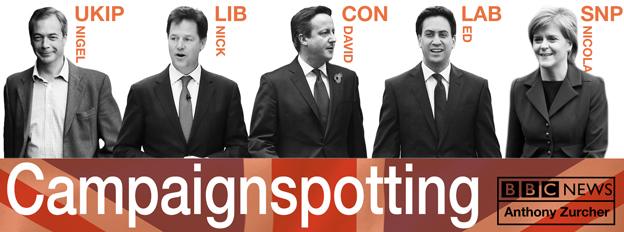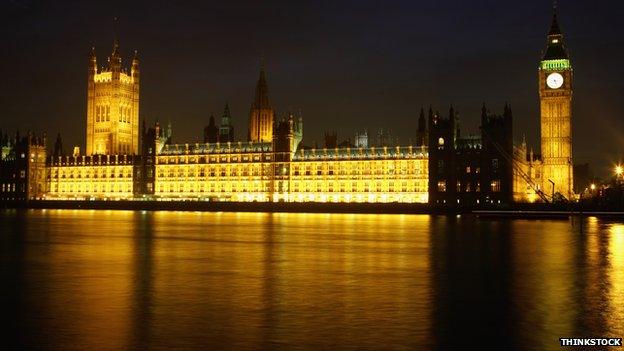Election 2015: The Americanisation of the UK election
- Published
- comments

The best thing about the British elections, some might say, is their relative brevity. "Shorter campaigns, better accents" is the slogan of this blog, after all.
But while 30 March was the ceremonial kick-off in a race that will end in just over a month, a shadow campaign has been going on much longer. And it has some analysts and politicians worried that the UK is heading down a path toward the US model of electioneering that lasts months and even years.
The culprit, they say, is the Fixed-term Parliaments Act, external, passed in 2011, which mandates general elections every five years. It's a change from past tradition, which set five years as the maximum the UK could go between balloting. More than likely, however, the prime minster used to call a "snap election" earlier, at a politically opportune time.
Under the current system an early vote requires the assent of two-thirds of Parliament or the failure to form a new government after a no-confidence vote.
The act was part of an agreement when the Conservative and Liberal Democrat parties joined a coalition government following the 2010 elections - one made primarily to protect against Conservatives dumping their partners and ordering a new election at the first chance they saw to win an outright majority of seats.
But, the criticism goes, that agreement came with a high price. A set election date has distracted politicians from the duties of their office, as a date certain for standing before voters looms on the horizon.
The Fixed-Term Act has resulted in a "zombie Parliament," writes Philip Johnston, external of the Telegraph, "with nothing to do in its last year except exist in the nether world of the living dead".

Paul Whiteley, a government professor at Essex University, says that there is, in fact, evidence that the UK campaign cycle is growing longer. Television adverts have been running since January, which for regulation purposes the UK Electoral Commission now recognises as the start of the election season.
Even earlier than that, he says, political parties have been investing in on-the-ground efforts, including updating voter information and organising volunteer forces.
"There was always a risk in the past that you might start running before the gun goes off," he says, noting that it could lead parties to waste money on fruitless efforts. "You can imagine identifying your supporters and then suddenly the election's off and you've got a year, and you have to do it all over again."
In October members of Parliament debated, external the value of fixed terms, with some Conservative and Labour members expressing their disapproval.
"Members do not particularly want to be in the chamber; they would rather be in their constituencies fighting an election campaign," said Labour MP Austin Mitchell. "That is what, at the end of this Parliament, we are really doing - if we are not fighting an election campaign, we are busy throwing custard pies at each other."
His proposed solution - shortening the fixed term - drew unfavourable comparisons with their counterparts in the US Congress, however.

Night is falling on this five-year fixed term
"Will my honourable friend just beware and look across the Atlantic, where there are two-year terms?" asked Labour MP Graham Allen. "The people in the Houses that are elected on that basis are permanently campaigning."
Fixed-term defenders counter that the benefits of the reform outweigh any possible concerns, however.
According to University of Oxford Associate Professor of Politics, Dr Petra Schleiter, even when elections weren't set in stone, by the time the fourth year of a government came around, politicians were distracted by "feverish speculation" on the exact date of an upcoming vote.
A crowded stage is a common sight in the US
She says the main benefit of having a fixed date is it makes elections easier to manage and more fair, by taking away the power the prime minister has in setting the date. She has studied, external parliamentary systems that feature flexible elections and says they give the governing party an inherent five-point advantage in the balloting.
"If you fix electoral terms, it deprives the prime minster of that bonus," she says. "It sort of levels the electoral playing field."
In January, Sir Alan Duncan, a Conservative MP from Rutland and Melton, introduced a bill, external to go back to the old system. While it did not receive a vote before Parliament was dissolved, its backers plan to continue their efforts after the election.

According to Ms Schleiter, however, prospects for passage are doubtful. With the rise of smaller parties like UKIP and the Scottish Nationals, chances are growing that no matter which major party ends up with more seats in May, the UK will likely once again be ruled by a coalition government. And for the same reason that the Liberal Democrats wanted the assurances that a fixed-term election gave them in 2011, whoever joins a coalition this time around will likely ask for the same.
So are the British creating a government that looks more like the US version? If so, Conservative MP Bernard Jenkin said during October's parliamentary debate, that is a dismal prospect.
"Let us look at the American Constitution," he said. "First, it is paralysed. It cannot get its deficit down, and it cannot elect a strong government. It can elect a president, but the separation of powers means that Congress can defeat everything the president wants to do. I do not think that that is a very good recipe."
There are quite a few Americans who, at this point, probably agree.